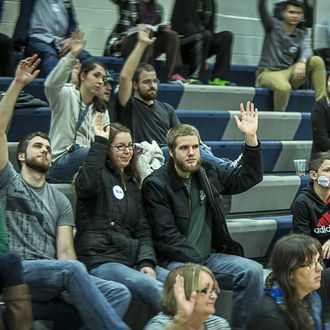
On Iowa caucus night, in the frenzied effort by the Clinton and Sanders campaigns to claim (or at least suggest) victory, anecdotes began drifting into the airwaves about irregularities in caucus procedures and other features of the system that allegedly obscured the will of the people. In particular, we heard about coin tosses that resolved ties over delegate selections — supposedly in Clinton’s favor — and then demands by Sanders’s campaign that the state Democratic Party do something it had never done before: release the raw vote totals that underlay the state-delegate-equivalent numbers reported to the media. There were also reports from both parties’ caucuses of precincts being overwhelmed by high turnout and running out of voter-registration forms (Iowa allows participants to register to vote or change their party affiliation on site at the caucuses).
Iowans are ever-sensitive to bad publicity about the caucuses, on the grounds that it might be used by Iowa’s jealous enemies to undermine its first-in-the-nation status. So the editorial board of the Des Moines Register on Thursday called for an audit of the results to provide greater transparency and tamp down the inevitable conspiracy theories.
Once again the world is laughing at Iowa. Late-night comedians and social media mavens are having a field day with jokes about missing caucusgoers and coin flips.
That’s fine. We can take ribbing over our quirky process. But what we can’t stomach is even the whiff of impropriety or error.
What happened Monday night at the Democratic caucuses was a debacle, period. Democracy, particularly at the local party level, can be slow, messy and obscure. But the refusal to undergo scrutiny or allow for an appeal reeks of autocracy.
The Register is alluding to the resistance of the state Democratic Party to an audit based on the traditional objection that candidates had — or at least were allowed to have — representatives in every room where votes were counted. Indeed, the whole process is largely self-policed by candidates.
[T]he results were too close not to do a complete audit of results. Two-tenths of 1 percent separated Bernie Sanders and Hillary Clinton. A caucus should not be confused with an election, but it’s worth noting that much larger margins trigger automatic recounts in other states.
Too many accounts have arisen of inconsistent counts, untrained and overwhelmed volunteers, confused voters, cramped precinct locations, a lack of voter registration forms and other problems. Too many of us, including members of the Register editorial board who were observing caucuses, saw opportunities for error amid Monday night’s chaos.
I was “observing caucuses,” too, and saw a lot of the same chaos and “opportunities for error.” But it’s unclear what can be done retroactively about, for example, people who left because they couldn’t register or the security gaps between the sign-in tables and the actual caucus site (I wandered in and out of three different precinct deliberations, and while I didn’t try to “caucus,” it’s not entirely clear I couldn’t have). Eight years ago I watched as several elderly Clinton supporters left a caucus site because no seating was available during the lengthy proceedings; the exact same thing may have happened in various places overwhelmed by high turnout Monday night. But this demand from the Register could be the real flash point:
Break silly party tradition and release the raw vote totals.
Team Bernie is quite sure the final raw-vote totals would show its candidate “winning” if the Democratic caucuses were run like that of the Republicans, with a one-participant, one-vote system rather than the convoluted state-delegate-equivalents process that about five people understand. But it’s unclear whether the right thing to audit is the final raw-vote tally or the initial caucus voters before (usually) Martin O’Malley’s supporters were realigned. Anecdotally, a big majority of O’Malley people deemed nonviable realigned for Bernie; that’s certainly the way it went down in the two precincts I observed. So by that standard Clinton may have won the popular vote after all.
The bottom line is that the Register is asking Iowa Democrats to turn over a lot of rocks from beneath which a lot of things that will not reflect well on Iowa will crawl out, and without necessarily resolving the question of who really won. Its suggestion of a “blue-ribbon commission” to improve caucus operations (the Iowa Republicans did something like that in 2012 after the state party put a big thumb on the scales of media coverage by erroneously calling Mitt Romney the winner on caucus night) makes sense. But the more everyone stares at the caucuses, the more questions will come up. In that respect, an audit would, if nothing else, reinforce Bernie Sanders’s claim that the results were a “virtual tie.” Who can say otherwise?
You also have to wonder if the brouhaha over the Democratic caucuses will by osmosis add legitimacy to the specious voter-fraud claims of Donald Trump, or even the dirty-tricks charge by Ben Carson — both aimed at Ted Cruz. We could wind up with nobody winning Iowa, which would not exactly convince future candidates and observers to invest the vast time and money Iowans crave.






























